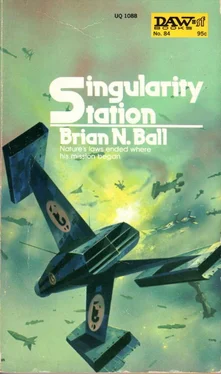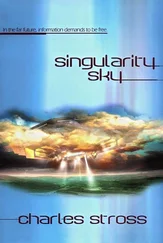Brian N. Ball
SINGULARITY STATION
Buchanan admitted to himself that he was worried, even though he was sure they’d give him the job. However much they wanted him to have the experimental Jansky Station, they were still a committee whose function it was to scrutinize every facet of his life, every last detail of his career and qualifications; it didn’t make for comfort to have such an inspection. The men and women facing him were well-disposed, even kindly. But they might just stand between him and the Jansky Singularity. And the ship he had lost.
He knew some of the members of the Board. Richtler, of course. And he’d heard of Kochan, shrewd and mysterious Kochan, who’d given up a seat on the Galactic Council to concentrate, so he said, on his personal interests. The others were average citizens, a wide spread of ages and appearances. Richtler and Kochan were the important ones; and Richtler was guiding the long interview with considerable skill to the conclusion he and Buchanan desired. Buchanan felt a muscle twitch over his left eyebrow as Richtler turned to him, with a half-smile on his face.
“You’ve given us a very clear picture of your early training, Mr. Buchanan. Apart from your successful completion of the Deep-space Program, you showed exceptional gifts in field theory…. Perhaps some of the other members of the Board would like to ask questions of a more general nature?” Buchanan felt his mouth go dry. “You’ll not object to some questions of a personal nature?” Richtler went on.
“No, sir.”
Richtler was not much older than he was—say in his mid-thirties. He too had once worked the uncertain dimensions between the spiraling arms of the Galaxy, though now he was the deskbound head of a big exploratory project out on the Rim. Richtler knew from personal experience, however, what the experimental station could mean, which was more than could be said for the rest of the archaically-titled Board for the Regulation of Space Hazards.
The Board had been set up at a time when everyday bits of junk like blown-up chemical and fission rockets littered Sol’s environs. Such shattered hardware, together with stray comets and the odd uncharted asteroid, constituted space hazards in the early days: now, the big ships were equipped with force-screens that could shunt whole planetary systems out of their paths if they had to. It was bizarre occurrences in the shifting fields of space-time like the Jansky Singularity that were the real hazards. Yet the Board’s resources were hopelessly inadequate to begin to survey the Singularity; they could do no more than mark it with robot beacons. Simply, there wasn’t the hard cash. Beginning as a semi-voluntary agency, the Board had never acquired the gritty ability to wrest proper finance from the Galactic Council, and it was only a combination of Richtler’s know-how and Kochan’s political skills that had at last managed to divert some of the central funds away from Exploration and Infragalactic Transport. Too many ships had been lost. Too many engulfed in the region of that unguessable enigma. When Kochan took an interest there was suddenly enough money to build a small, permanent station that could endure the terrible forces of the Singularity. A one-man artificial planet, Buchanan had to be the man. Some of the lay members of the Board asked the inane questions he expected. Did he not regret the days when the big ships were crewed by real field engineers and real deep-space commanders, like himself?
(He fended that one off easily.) Why had he refused another appointment with infragalactic? (That was easy too: he’d become a freelancer.) Well then, how had he adapted to free-lancing? (Well enough, until the Jansky Station project was rushed through.) What the Board’s members meant was how did the captain of a huge ship settle for working for wealthy private owners, for doing odd jobs for the big corporations, for hiring out to the junk-merchants who made a living from the wrecks of the past thousand years?
Buchanan explained that he’d found free-lancing interesting, but not fulfilling. They smiled in agreement There’d be plenty of fulfillment out at the Singularity.
Someone asked if it worried him that the station had no deep-space engines of its own. Buchanan smiled. He said he could rely on the Committee to send another tug to collect him when the job was done.
“Mr. Buchanan, have you given consideration to the dangers of the post you’re applying for?” asked a thin-faced middle-aged man in a high-pitched earnest voice.
Buchanan was amused; he thought of the man’s amazement should he learn what was behind his application.
Richtler frowned. “Mr. Buchanan knows what he has volunteered for, Mr. Chafe. I’m sure he has assessed the dangers better than any man living.”
It was a lapse of good manners. Chafe inspected the papers before him to cover his embarrassment.
“Ah, of course! Yes!”
Buchanan was not offended. He could not be hurt anymore. Not unless he hurt himself. He relaxed for a moment, and thus it was that Kochan’s question caught him off-balance.
“You’re a young and energetic man,” shrewd old Kochan said, walnut-patterned brown face unsmiling, clear black eyes piercingly bright, “and you are known to be considering matrimony—it’s no secret! Your application for the benefits of matrimonial status was filed six months ago. Naturally, since all information regarding candidates comes through to us, we must consider their emotional background.” Buchanan cursed silently. The comps didn’t forget. He had. It would have taken a few moments to cancel the request. “You’ll be on the station alone for an indeterminate period,” Kochan went on. “How will the future Mrs. Buchanan react to this?”
The big blue clock behind Kochan blurred as Buchanan felt the cold realization of aloneness. So far, he had been buoyed up by the excitement of the Jansky Station project. He had been away from Center for months, and it was only when he had returned—was it just five days ago!—that he had learned of the Board’s new venture. He had gone to see Richtler just as Richtler had been about to summon him. And there had been no time to suffer the chill of separation from Liz Deffant. Was it too late, even now, to get her back?
Perhaps she would still be around, waiting? No! She’d waited for three years while they built up the capital to charter the small scout vessel which would be their home as well as a source of income—she with her ecological training, himself as crew. There was plenty of free-lance work for skills such as hers, especially when they were allied to his experience. What a life it could have been!
It was over. Liz had blazed at him in a cold fury. By now she was probably on her way back to the remote world she’d told him about—remote, fairly sophisticated, and independent: people who didn’t take to too much direction from Center. They’d colonized the planet out in Messier 16 in two generations. And one of those sturdy colonizers would be only too incredulously unable to believe his luck as Liz Deffant returned. She’d made it clear enough that she was going back.
“That’s a point,” said Chafe, happy to be able to comment. “Mrs. Buchanan, now? How’s she going to take to being a station-widow?”
There was frank interest in the faces of the women members of the Board. They didn’t know much about field theory—Richtler apart—and they could only guess at the strains of life in the unstable wild regions about the edges of the Jansky Singularity, but they did know about the effects of prolonged separation.
“There won’t be a Mrs. Buchanan.”
Kochan’s gaze bored into Buchanan’s face.
Читать дальше












